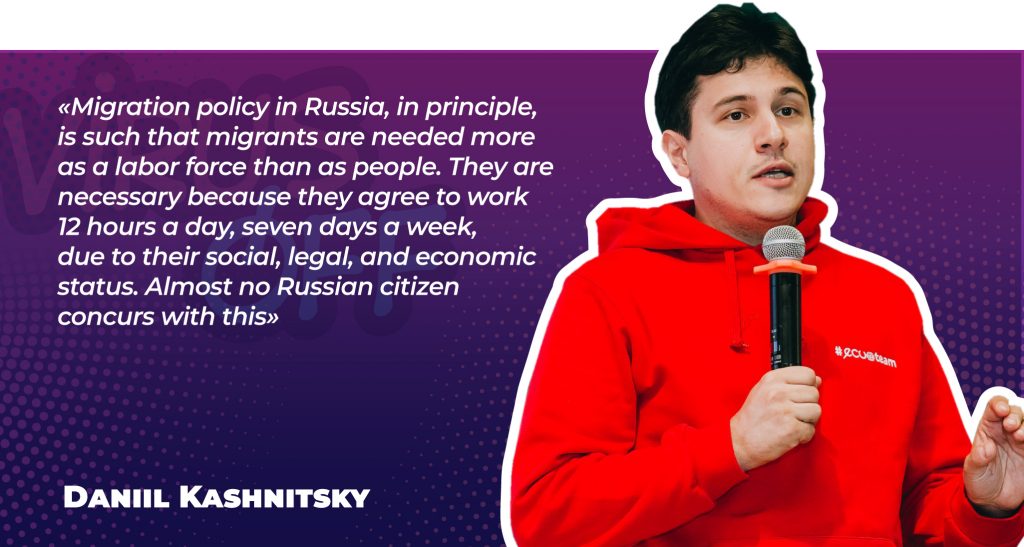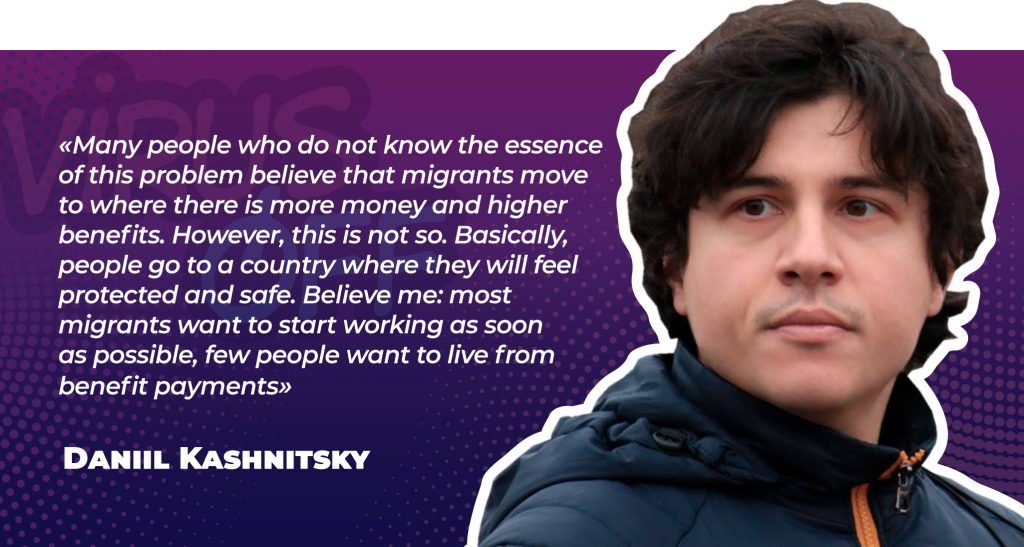Vaccination against COVID-19 in Russia should be free and accessible to all categories of citizens. It doesn’t matter what nationality a person is, whether he has a passport or a legal job. This opinion was expressed in an interview with VirusOFF by Daniil Kashnitsky, Junior Researcher at the Institute for Social Policy, National Research University Higher School of Economics, coordinator for work with the academic community of the Regional Expert Group on the Health of Migrants. Details are in today’s article.
Daniel, as far as I know, the main topics you work with are migrants and public health. Tell me how much the health of migrants has worsened in connection with the coronavirus pandemic?
Of course, many problems arose when the pandemic began, and there were hard lockdowns at the very beginning (this is from about April to June 2020). They were mainly caused by people’s inability to go home to their homeland. Or, on the contrary, having left, they could not return to Russia to continue their work. It is perhaps necessary to clarify that Russia is the leading host country in the EECA region. More than 80% of labor migrants from this region work here to support their households. Then, at the beginning of the pandemic, many people were not only trapped in a foreign country, but many migrants living with HIV were unable to receive ARV therapy on time.
Are you involved in any projects that help migrants ensure the continuity of antiretroviral drugs when supplies are nearly depleted?
Yes, we are. There is, for example, the Step to Health program, which the Steps Foundation supports. Regardless of where they are, a person can call or write to the workers and/or volunteers of the fund, and then, depending on their needs, remote consultation with specialists can be organized. This program aims to help international migrants. Now, when the lockdown is no longer in this form, the program still works and will continue to develop. Recently, it received support from the Moscow government.
The important point is that by the end of 2020, the number of migrants in Russia decreased by almost two times compared to the level of 2019, and the number of migrants’ requests for help in a difficult situation, who, for example, needed therapy or other types of assistance, doubled. The most common type of assistance during a pandemic is the provision of ARV therapy from “backup kits.” It is not a sustainable solution, but it can be a lifesaver in difficult times when people do not have access to sustainable HIV services.
Can we say that migrants turned out to be of no use to anyone during a pandemic?
This wording requires clarification. Migration policy in Russia, in principle, is such that migrants are needed more as a labor force than as people. They are necessary because they agree to work 12 hours a day, seven days a week, due to their social, legal, and economic status. Almost no Russian citizen concurs with this. This situation is undoubtedly beneficial for employers, and it turns out that for the country too. Therefore, on the one hand, migrants are needed, but they are not very needed as people.
On the other hand, Russia is now very actively issuing citizenship, and there are international agreements that facilitate migrants’ access to the country and make it possible to work legally. The country has a difficult demographic situation. The country needs new Russians, which means Russia still needs new people. It is a process that has at least two opposite directions.
Some international sites write that migrants risk contracting coronavirus almost two times higher than others. How can that be explained?
I explain: here, we are not talking about a physiological feature. Migrants are no different from all other people. But since migrants very often live in crowded, poorly heated premises, combined with hard work, demanding access to treatment, and poor nutrition, this leads to an increased risk of contracting coronavirus infection. Add to this the fact that migrants have lower access to vaccinations since only legally staying migrants can receive the vaccine in Russia, a one-component vaccine. It is good that it exists, but it does not cover all migrants.

How willing are migrants to vaccinate? And are there any special mobile clinics for them or something like that?
It is a big problem because everything is in the hands of the state. Vaccinations are done in clinics and mobile points. You can also get vaccinated in private clinics, but there, as public institutions, they require a compulsory medical insurance policy. Therefore, this is an unacceptable option for people without documents. Foreigners are vaccinated only for money and only with a single-component vaccine. Again, this service is only available to foreigners with legal status.
Maybe then it’s better to make it free for everyone?
Of course, it would be essential to make vaccination available to everyone, regardless of legal status. And not only for reasons of protecting human rights (although this is also important), but mainly because it is an infection transmitted by airborne droplets. It does not at all choose whether a person has documents or not. It is essential to vaccinate everyone, especially since Russia has a promising vaccine. Although it did not pass the WHO pre-qualification, it showed an excellent result according to the test results. And it is, which is important, cheap. I really don’t know why today it is not available to everyone. We will assume that it is a question of bureaucracy at this stage.
Have you been vaccinated yourself?
Yes, of course. I was vaccinated in February of this year for the first time, with two Sputnik doses. Six months later, I made a one-component re-vaccination. Next February, I will do a re-vaccination again.
Have you had any fear or anxiety about vaccination?
In February, the data was not enough. Still, there was already a recommendation from the Russian Ministry of Health. Many of my friends had already been vaccinated, so I had no doubt that it was necessary to be vaccinated. I just went and did it. One day I had symptoms similar to a common cold, and that’s it. In addition, before the vaccination, I had already had a coronavirus, so I knew what it was. Since I was vaccinated, I have not been ill at all.
Let’s get away from the topic of coronavirus. Tell me, when you read the news about the next migrant crisis, such as the one that occurred on the territory between Poland and Belarus, when hundreds of people were stuck at the border, what emotions do you have? How do you react to this?
You can say as much as you like that this is a provocation or an attempt to aggravate the situation. You can find many geopolitical reasons for this and who is to blame. But in these attempts, we forget about the people themselves – about the migrants. And among these hundreds of people, some really need protection. But mostly, these are people who have suffered due to wars. Therefore, being in a country where there is a military conflict, a person and his family will use every opportunity to leave. There are many people of this kind in the world. They will continue to come to richer and safer countries, countries where there is hope that you will now overcome difficulties, sometimes incompatible with human dignity and often with life in general. But then there will be an opportunity to settle down in a new country. Many people who do not know the essence of this problem believe that migrants move to where there is more money and higher benefits. However, this is not so. Basically, people go to a country where they will feel protected and safe. Believe me: most migrants want to start working as soon as possible, few people want to live from benefit payments.

You have said more than once that you communicate a lot with migrants themselves and document their stories in your interviews. Which ones impressed you the most?
These are the stories of HIV-positive migrants. To obtain a residence permit or a patent in Russia, one must also take an HIV test to get a certificate of absence of HIV infection. Therefore, people who turn out to be HIV-positive are automatically excluded from this process. Not being ready for this, their life trajectory completely changes. Imagine: you’re a migrant from a rural area from Central Asia, you saved money for a trip to Moscow or even borrowed money, you have high hopes. And suddenly you find out that you can neither work in this country legally nor live. Moreover, you have been diagnosed with a disease. And it is still a shame to talk about in a mass opinion. We have many similar stories. Last week I contacted a man in St. Petersburg; his brother ended up in an infectious diseases hospital in intensive care. He has been living with HIV for four years, and this year his documents expired, and he lived in Russia illegally. And he worked too. This man was about to go home to renew his documents and suddenly ended up in the hospital, suspected of having lymphoma. But he could remain absolutely healthy if he was consulted on time and if he had access to treatment. But he, of course, did not tell anyone about his HIV status, realizing that a migrant can’t get a work permit with such a diagnosis in Russia. And to go home – too, because he will no longer be allowed into the country if he leaves Russia. It’s a double-edged sword. I can tell a lot of similar stories.
Don’t you think that migrants have become subject to the same discrimination as drug users and HIV-positive people over the past few years, for example?
No, at least in my circle, I did not notice this. If we are talking about the media, the situation there is different. For many years, many Russian mass media have been fanning hatred towards migrants. This search for a permanent enemy leads to today witnessing an incredible campaign to incite hatred against migrants, contrary to official statistics. The latter confirms that the level of crime among migrants is not at all higher than among the country’s citizens. Sometimes, it seems that if people are left alone, they will agree with each other much faster.
Text: Elena Derzhanskaya
Photo: Personal archive of the hero
A series of materials created supported by UNAIDS




